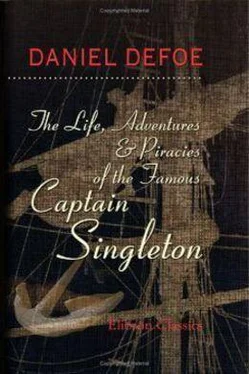This advice was so reasonable that we all approved of it; and accordingly we calculated that we were able to carry provisions for forty–two days, but that we could not carry water for above twenty days, though we were to suppose it to stink, too, before that time expired. So that we concluded that, if we did not come at some water in ten days' time, we would return; but if we found a supply of water, we could then travel twenty–one days; and, if we saw no end of the wilderness in that time, we would return also.
With this regulation of our measures, we descended the mountains, and it was the second day before we quite reached the plain; where, however, to make us amends, we found a fine little rivulet of very good water, abundance of deer, a sort of creature like a hare, but not so nimble, but whose flesh we found very agreeable. But we were deceived in our intelligence, for we found no people; so we got no more prisoners to assist us in carrying our baggage.
The infinite number of deer and other creatures which we saw here, we found was occasioned by the neighbourhood of the waste or desert, from whence they retired hither for food and refreshment. We stored ourselves here with flesh and roots of divers kinds, which our negroes understood better than we, and which served us for bread; and with as much water as (by the allowance of a quart a day to a man for our negroes, and three pints a day a man for ourselves, and three quarts a day each for our buffaloes) would serve us twenty days; and thus loaded for a long miserable march, we set forwards, being all sound in health and very cheerful, but not alike strong for so great a fatigue; and, which was our grievance, were without a guide.
In the very first entrance of the waste we were exceedingly discouraged, for we found the sand so deep, and it scalded our feet so much with the heat, that after we had, as I may call it, waded rather than walked through it about seven or eight miles, we were all heartily tired and faint; even the very negroes laid down and panted like creatures that had been pushed beyond their strength.
Here we found the difference of lodging greatly injurious to us; for, as before, we always made us huts to sleep under, which covered us from the night air, which is particularly unwholesome in those hot countries. But we had here no shelter, no lodging, after so hard a march; for here were no trees, no, not a shrub near us; and, which was still more frightful, towards night we began to hear the wolves howl, the lions bellow, and a great many wild asses braying, and other ugly noises which we did not understand.
Upon this we reflected upon our indiscretion, that we had not, at least, brought poles or stakes in our hands, with which we might have, as it were, palisadoed ourselves in for the night, and so we might have slept secure, whatever other inconveniences we suffered. However, we found a way at last to relieve ourselves a little; for first we set up the lances and bows we had, and endeavoured to bring the tops of them as near to one another as we could, and so hung our coats on the top of them, which made us a kind of sorry tent. The leopard's skin, and a few other skins we had put together, made us a tolerable covering, and thus we laid down to sleep, and slept very heartily too, for the first night; setting, however, a good watch, being two of our own men with their fuzes, whom we relieved in an hour at first, and two hours afterwards. And it was very well we did this, for they found the wilderness swarmed with raging creatures of all kinds, some of which came directly up to the very enclosure of our tent. But our sentinels were ordered not to alarm us with firing in the night, but to flash in the pan at them, which they did, and found it effectual, for the creatures went off always as soon as they saw it, perhaps with some noise or howling, and pursued such other game as they were upon.
If we were tired with the day's travel, we were all as much tired with the night's lodging. But our black prince told us in the morning he would give us some counsel, and indeed it was very good counsel. He told us we should be all killed if we went on this journey, and through this desert, without some covering for us at night; so he advised us to march back again to a little river–side where we lay the night before, and stay there till we could make us houses, as he called them, to carry with us to lodge in every night. As he began a little to understand our speech, and we very well to understand his signs, we easily knew what he meant, and that we should there make mats (for we remembered that we saw a great deal of matting or bass there, that the natives make mats of)—I say, that we should make large mats there for covering our huts or tents to lodge in at night.
We all approved this advice, and immediately resolved to go back that one day's journey, resolving, though we carried less provisions, we would carry mats with us to cover us in the night. Some of the nimblest of us got back to the river with more ease than we had travelled it the day before; but, as we were not in haste, the rest made a halt, encamped another night, and came to us the next day.
In our return of this day's journey, our men that made two days of it met with a very surprising thing, that gave them some reason to be careful how they parted company again. The case was this:—The second day in the morning, before they had gone half a mile, looking behind them they saw a vast cloud of sand or dust rise in the air, as we see sometimes in the roads in summer when it is very dusty and a large drove of cattle are coming, only very much greater; and they could easily perceive that it came after them; and it came on faster as they went from it. The cloud of sand was so great that they could not see what it was that raised it, and concluded that it was some army of enemies that pursued them; but then considering that they came from the vast uninhabited wilderness, they knew it was impossible any nation or people that way should have intelligence of them or the way of their march; and therefore, if it was an army, it must be of such as they were, travelling that way by accident. On the other hand, as they knew that there were no horses in the country, and that they came on so fast, they concluded that it must be some vast collection of wild beasts, perhaps making to the hill country for food or water, and that they should be all devoured or trampled under foot by their multitude.
Upon this thought, they very prudently observed which way the cloud seemed to point, and they turned a little out of their way to the north, supposing it might pass by them. When they were about a quarter of a mile, they halted to see what it might be. One of the negroes, a nimbler fellow than the rest, went back a little, and came in a few minutes running as fast as the heavy sands would allow, and by signs gave them to know that it was a great herd, or drove, or whatever it might be called, of vast monstrous elephants.
As it was a sight our men had never seen, they were desirous to see it, and yet a little uneasy at the danger too; for though an elephant is a heavy unwieldy creature, yet in the deep sand, which is nothing at all to them, they marched at a great rate, and would soon have tired our people, if they had had far to go, and had been pursued by them.
Our gunner was with them, and had a great mind to have gone close up to one of the outermost of them, and to have clapped his piece to his ear, and to have fired into him, because he had been told no shot would penetrate them; but they all dissuaded him, lest upon the noise they should all turn upon and pursue us; so he was reasoned out of it, and let them pass, which, in our people's circumstances, was certainly the right way.
They were between twenty and thirty in number, but prodigious great ones; and though they often showed our men that they saw them, yet they did not turn out of their way, or take any other notice of them than, as we might say, just to look at them. We that were before saw the cloud of dust they raised, but we had thought it had been our own caravan, and so took no notice; but as they bent their course one point of the compass, or thereabouts, to the southward of the east, and we went due east [? west], they passed by us at some little distance; so that we did not see them, or know anything of them, till evening, when our men came to us and gave us this account of them. However, this was a useful experiment for our future conduct in passing the desert, as you shall hear in its place.
Читать дальше












